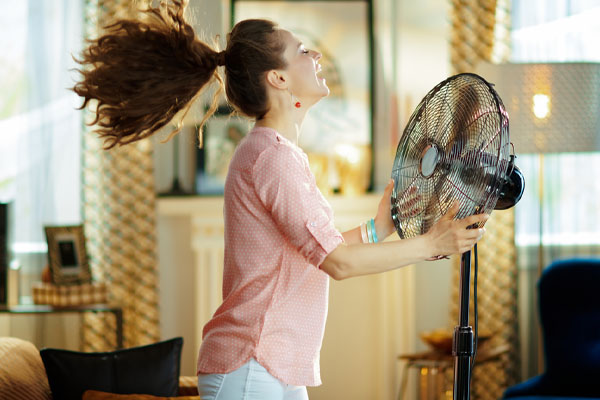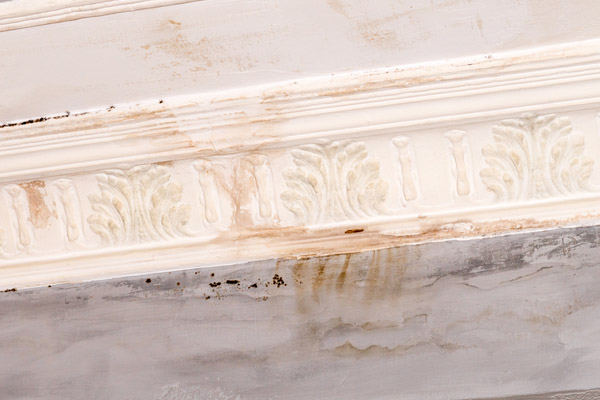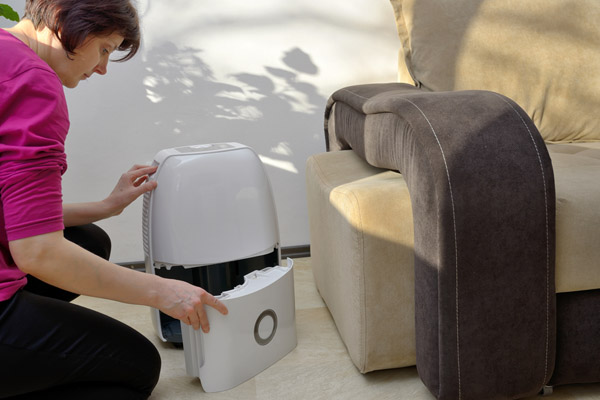Contents
- 1 Why Does My House Feel So Humid?
- 2 Why Excess Humidity Is Bad
- 3 How Can You Tell If You Have Excessive Humidity in Your Home?
- 4 Causes Of High Humidity Levels in Your Home
- 5 Benefits Of Good Humidity Levels
- 6 How To Decrease Humidity in Your House
- 7 Give Wilcox Energy A Call For All Your HVAC Requirements

Home comfort is more than just regulating the temperature via your HVAC system. Families should consider other factors, such as humidity, which is the amount of moisture in the air. Humidity levels that rise higher than the ideal range can make people start seeing and feeling its adverse effects. Many homeowners typically ask, “Why is my house so humid?” This article discusses the different causes of excess humidity and the methods for solving this indoor air quality problem.
Why Does My House Feel So Humid?
Check your home’s indoor humidity if your air conditioner works fine but you still feel discomfort. The humidity levels may be too high. According to experts, the humidity in the air should be around 30% to 50%. Plunging below the minimum level isn’t suitable for your home. Having the humidity level rise far above the maximum suggested range can also be problematic. Homes may experience excess humidity from property damage, poor design, incompatible system, and environmental factors.
Why Excess Humidity Is Bad
The body sweats when it’s hot to start evaporative cooling. When there is excessive humidity, the air already has high moisture. This makes people feel hot and sticky no matter the temperature inside their homes. Apart from the discomfort, you may also get dehydrated because the body keeps producing more sweat to cool down without relief. You should replenish the lost water and electrolytes.
Your household may also suffer from health issues. Bacteria thrive in hot and humid environments, so they may start growing in areas with the highest moisture content. Dust mites, mildew, and mold will also thrive in these areas. Allergic reactions may be triggered in sensitive individuals when exposed to mold spores. People with compromised respiratory systems may also suffer from asthma attacks. Others may complain about having trouble sleeping at night or breathing problems.
Related Article: Control Temperature & Humidity More Effectively With A Modulating Air Conditioner
How Can You Tell If You Have Excessive Humidity in Your Home?

Excess humidity will be evident if you know what to look for. Signs could be found everywhere that you might have noticed before but didn’t realize what they were. This time, you can do a thorough check while keeping an eye out for these signs:
- Visible Condensation: When there is cold weather, the moisture in the air can condense into liquid. This tends to happen on window panes. The droplets on the gas can make it blurry, so you need to wipe it to be able to see through. You may also find water droplets on metal doors.
- Peeling Paint: At times, high humidity can result in moisture on the walls. You may see the wallpaper or paint wrinkling or developing bubbles. Continuous exposure to moisture can result in the paint to begin peeling.
- Wet Stains: Check the ceiling to ensure that its color is still uniform. If there are wet stains, they may point to above-average humidity in your home. These stains can also sometimes extend down the walls.
- Dark Spots: Assess surfaces for dark spots because these can point to mold and mildew. The fungi are usually black or dark green. Areas with high humidity also encourage mold to grow, including attics, kitchens, basements, and bathrooms.
- Persistent Sweat: Persistent sweat is the number one physical sign of high humidity. Sweat typically evaporates from the skin quickly and provides a cooling effect. Sweat that doesn’t go away means you will feel hot and sticky. It cannot evaporate as the ambient air is already thick with moisture.
Related Article: What’s The Difference Between A/C Condensers & Evaporator Coils?
Causes Of High Humidity Levels in Your Home

Here are several reasons your home has high humidity levels:
- Everyday Activities: We use a considerable amount of water in our homes during washing, bathing, and cooking. Some water evaporates and mixes with the indoor air as water vapor. This rise in humidity is only for a short period if the house is designed well.
- Poor Ventilation: Wet areas should have excellent ventilation so excessive moisture can be released outdoors and the indoor humidity can stay within the ideal levels. For instance, bathrooms are usually equipped with exhaust fans or windows to deal with moisture.
- Plumbing Leaks: Excess moisture can be from roofing or plumbing leaks. You may need to call a plumber or roofer to handle these issues. They can find the source and repair the problem permanently.
- Oversized Air Conditioner: A mismatch in air conditioner size and the home’s cooling needs may be causing the problem. An air conditioner that’s too large will immediately reach the set temperature in the thermostat and shut off automatically before it can lower the indoor humidity. You may need to replace the HVAC system.
- Moisture Seepage: You should also watch out for water that enters your home via the ground. Water can seep through walls and cause basement surfaces to get wet. This issue can be minimized with proper ventilation and waterproofing.
Benefits Of Good Humidity Levels
We have established that high humidity is due to the prevalence of pollutants and allergens. Controlling how much moisture is in the air allows you to reduce unwanted particles to keep respiratory issues at bay. Homes will also become healthier spaces, and the sweaty and sticky feeling will disappear. Reducing the humidity level will help your home feel comfortable year-round.
It is bad to have extremely low humidity. It can cause sore eyes, nasal congestion, dry skin, and an irritated sinus. Wallpaper may peel off, houseplants wither, and hardwood floors may crack and separate. Wooden furniture may also crack and split if the low humidity persists for a few weeks. The humidity should stay within the ideal range. Some indoor thermostats can help you measure the humidity and temperature so you can monitor them constantly.
Related Article: Where Are Those Air Conditioner Smells Coming From?
How To Decrease Humidity in Your House

You can reduce the humidity in your home through the following steps:
- Use a Dehumidifier: Dehumidifiers can remove moisture in the air and lower indoor humidity. They are available in various sizes, so they are compatible with the unique needs of every home. Homeowners should consider using whole-home dehumidifiers as an overall solution.
- Improve Ventilation: Ensure that rooms with high moisture levels have good air movement. These rooms include the bathroom and kitchen. If the rooms have windows, keep them open as often as possible. Turn on exhaust fans, if there are any, to force the humid air out.
- Apply Weatherstripping: Seal the edges of windows and doors to keep the humid air from getting inside your home. Ensure that the seal is airtight by using weatherstripping products. Use caulking on the edges of wet areas like toilets, tubs, and sinks.
- Increase Insulation: Insulation can prevent conditioned air from through the gaps in the walls. It also acts as a thermal barrier between the inside and outside of your home.
- Proper Air Conditioning Sizing: Oversized air conditioners are problematic. During a routine maintenance check, ask your HVAC contractor if your current air conditioner is the correct size for your home. Old air conditioners that are too large may need to be replaced with a smaller one that is more compatible with your home’s cooling needs. It can also reduce the humidity to achieve the ideal range.
Conclusion
Many homes are dealing with a surplus of humidity. Stop the discomfort and ensure a healthier environment by dealing with the issue directly. Try reducing the moisture in your indoor air using the reduction strategies in this article. Make sure to call for HVAC professionals if the problem persists. They can recommend advanced solutions at affordable prices.
Related Article: Air Conditioner Makes Loud Noise When Starting
Give Wilcox Energy A Call For All Your HVAC Requirements

Wilcox Energy guarantees top-notch HVAC services throughout southern Connecticut. We have the best professionally-certified technicians who are experts in superior heating and cooling replacements, installations, repairs, maintenance, and more. Our highly trained, experienced, and knowledgeable techs can service any HVAC system correctly.
Our company offers the region’s most affordable HVAC service prices. Our tune-up services can enhance your home’s comfort, indoor air quality, and energy efficiency while lowering your cooling expenses. If you need to replace or repair your HVAC unit, we can provide the best solutions while working within your budget. Schedule a service appointment with Wilcox Energy today. We offer free, in-home estimates.
For more information about our HVAC services, be sure to contact Wilcox Energy. You can click here to contact us, or you can call us at (860) 399-6218 to find out more. We offer a full line of heating and cooling repairs, maintenance services, and installations. Click the link to view our service area.
